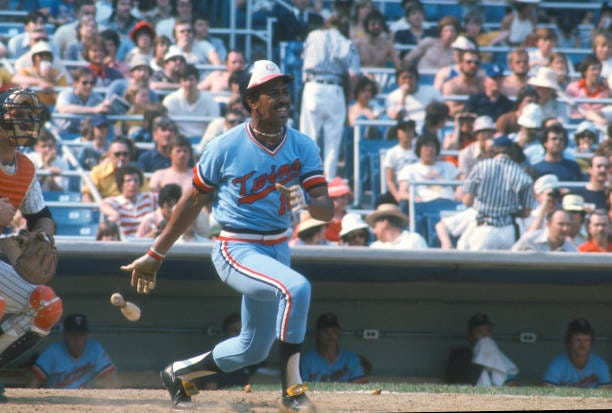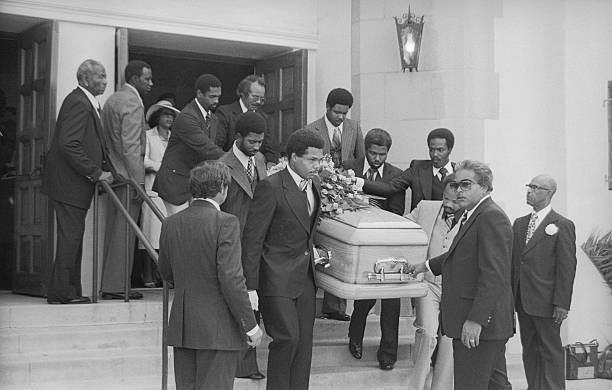
Lyman Bostock is one of the most tragic, yet untold stories in the history of Major League Baseball. Bostock, who played in Minnesota for three seasons at the start of his career, is the only player in the history of MLB to be murdered during the season.
In his years in Minnesota, Bostock was one of the Twins’ best players, hitting over .300 twice and was also a very good centerfielder. Unfortunately for Twins fans, the team wasn’t willing to part with the money needed to keep Bostock who was one of the first big dollar free agents in the 70s and signed in California.
After a game in Chicago in 1978, Bostock, who was playing for the Angels, was shot in Gary, Indiana while riding in the backseat of a car. Bostock was visiting family in Gary which he frequently did when in Chicago. He had large amounts of extended family in Gary, where he did spend part of this childhood.
The murderer, Leonard Smith, claimed he was aiming his anger at his estranged wife who was in the car with Bostock. In the end, his career and life was cut short by being in the wrong car at the wrong time.
Fox Sports’ Tom Rinaldi served as an executive producer, writer, and host of an eight-part podcast series titled “Wesley.” The series examines the heartbreaking story of Lyman Wesley Bostock Jr.
Rinaldi spoke to WCCO’s Chad Hartman about the podcast and the circumstances surrounding the death of Bostock.
The podcast is called “Wesley” because that is what Bostock’s family called him according to Rinaldi.
“I got a chance to tell this story 14 years ago for ESPN, but in a much more limited way,” Rinaldi explains about Lyman Bostock’s story. “Knowing, grateful, but knowing, there was so much more we could share with people about Lyman’s life.”
The podcast examines many aspects of Bostock’s life and what has shaped him, including his estrangement from his father who was a player in the Negro Leagues, the tumult of the late 1960s, his arrest as part of a student protest and more.
Bostock raced through the minor leagues and debuted with the Twins in 1975.
“He immediately had Rod Carew as a mentor who is featured in the podcast,” says Rinaldi. “Players like George Brett, Ken Landreaux, Carney Lansford, many of whom were brought to tears more than once in sharing their memories about what a remarkable spirit and soul Lyman Bostock was. Before at age 27, in the wrong place at the wrong time through no fault of his own, was shot and killed.”

Rinaldi also explains that it is remarkable to him that very few people seem to know or remember. And it happened in an era where you didn’t stop playing either.
“Carney Lansford, rookie teammate of Bostock on that Angels team, he took Lyman’s place in the batting order, that Sunday day game,” Rinaldi says. “First time up at the plate, he homers. Breaks down recounting running around the bases at old Comiskey Park, tears in his eyes. How devastated the clubhouse was. The unthinkable you would play a game. Lyman wasn’t pronounced dead until early that morning, that Sunday morning. And hours later, a day game at Comiskey, the Angels play.”
Rinaldi also talks about the man that killed Bostock, Leonard Smith, who was allegedly trying to kill his wife and struck Bostock. The woman, Barbara Smith, had been staying with friends of the Bostocks while estranged from her husband. When Leonard Smith saw them in the backseat of the car, he wrongly assumed they were having an affair. Barbara Smith was hospitalized with pellet wounds from the shotgun blast. That same blast hit Bostock in the temple, a wound which he wouldn’t survive.
“The first jury deadlocks,” says Rinaldi about Smith’s trial. “Hung jury. Second jury comes back with a verdict, not guilty by reason of insanity. Leonard’s mom had acquired the use of a fantastic attorney, sort of like the Johnny Cochran of northwest Indiana in those parts at the time, who used that defense. And ultimately the jury came back with that verdict. At that time, that meant that Leonard Smith was sent to a mental hospital. After a period of six months of evaluation, he was deemed no longer insane.”
Smith was then set free, back into society in 1980. When Rinaldi originally told the story 14 years ago, Smith lived just six blocks from the intersection where he killed Lyman Bostock. Smith passed away in 2010 of natural causes at age 64.
The podcast premieres Monday, July 18. You can listen to the entire podcast from FOX Sports and Rinaldi here.


